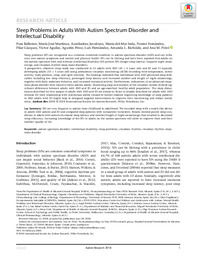Título :
Sleep problems in adults with autism spectrum disorder and intellectual disability |
Autor :
Ballester, Pura 
Martínez, María José
Javaloyes, María Auxiliadora 
Inda, María del Mar
Fernández, Noemí
Gázquez, Pilar
Aguilar, Víctor 
Pérez, Agustín
Hernández, Luís
Richdale, Amanda 
Peiró, Ana  |
Editor :
Wiley Online Library |
Departamento:
Departamentos de la UMH::Farmacología, Pediatría y Química Orgánica |
Fecha de publicación:
2019-01 |
URI :
https://hdl.handle.net/11000/32359 |
Resumen :
Sleep problems (SP) are recognized as a common comorbid condition in autism spectrum disorder (ASD) and can influence core autism symptoms and mental and physical health. SPs can be lifelong and have been reported that adults on the autistic spectrum with and without intellectual disability (ID) present SPs (longer sleep latency, frequent night awakenings, and circadian rhythm sleep-wake disorders). A prospective, objective sleep study was conducted in 41 adults with ASD (33 ± 6 years old) and ID and 51 typically developing adults (33 ± 5 years old) using ambulatory circadian monitoring (ACM) recording wrist temperature, motor activity, body position, sleep, and light intensity. The findings indicated that individuals with ASD presented sleep difficulties including low sleep efficiency, prolonged sleep latency and increased number and length of night awakenings, together with daily sedentary behavior, and increased nocturnal activity. Furthermore, indications of an advanced sleep-wake phase disorder were found in these autistic adults. Examining sleep and markers of the circadian system showed significant differences between adults with ASD and ID and an age-matched, healthy adult population. The sleep disturbances described for this sample of adults with ASD and ID are similar to those of already described for adults with ASD without ID; their relationship with intellectual ability should be further studied. Improving knowledge of sleep patterns in ASD adults with ID might help to designed targeted interventions to improve their functioning and reduce family stress. Autism Research 2019, 12: 66-79. © 2018 International Society for Autism Research, Wiley Periodicals, Inc. LAY SUMMARY: SPs are very frequent in autism from childhood to adulthood. We recorded sleep with a watch-like device in adults with autism and ID and compared sleep patterns with nonautistic volunteers. Results showed poorer sleep conditions in adults with autism (increased sleep latency and number/length of night awakenings) that resulted in decreased sleep efficiency. Increasing knowledge of the SPs in adults on the autism spectrum will allow to improve their and their families' quality of life.
|
Palabras clave/Materias:
autism spectrum disorder
circadian rhythm
circadian rhythm sleep-wake disorder
intellectual disability
sleep problems |
Área de conocimiento :
CDU: Ciencias aplicadas: Medicina: Farmacología. Terapéutica. Toxicología. Radiología |
Tipo de documento :
info:eu-repo/semantics/article |
Derechos de acceso:
info:eu-repo/semantics/openAccess |
DOI :
https://doi.org/10.1002/aur.2000 |
Publicado en:
Autism Research: official journal of the International Society for Autism Research. 2019 Jan;12(1):66-79 |
Aparece en las colecciones:
Artículos - Farmacología, Pediatría y Química Orgánica
|

 La licencia se describe como: Atribución-NonComercial-NoDerivada 4.0 Internacional.
La licencia se describe como: Atribución-NonComercial-NoDerivada 4.0 Internacional.
.png)